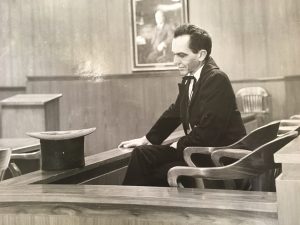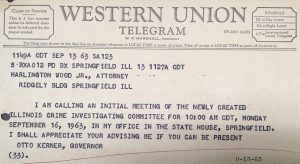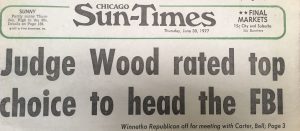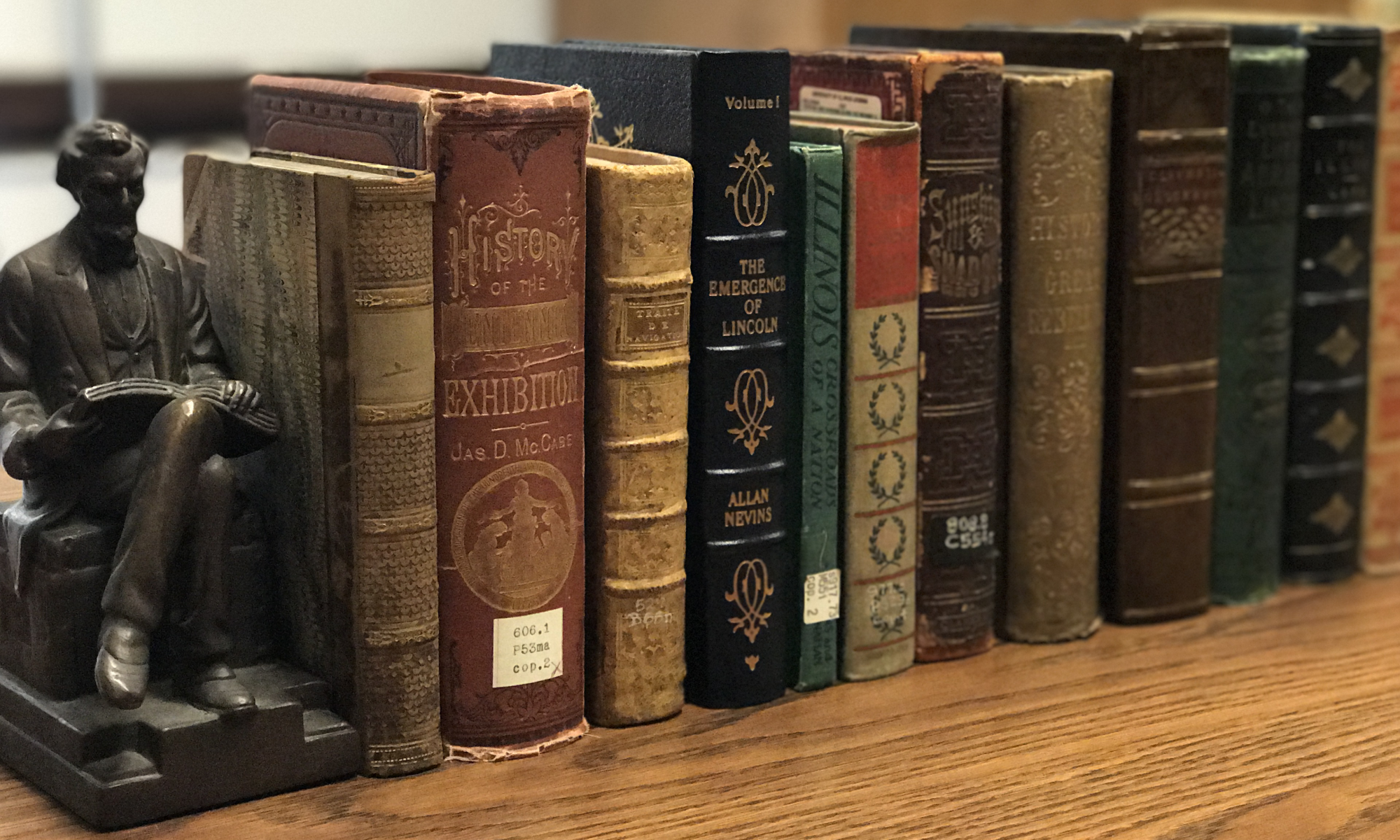Throughout the month of October, our focus is on crime in Illinois history. Follow along here and on our social media to learn more about the crimes, cases, and trials that have left their mark on Illinois.
Harlington Wood Jr. (1920-2008) was a federal judge and former Justice Department official with a prolific career in Illinois government. Wood served as U.S. Attorney, then U.S. District Judge, for the Southern District of Illinois. He went on to the U.S. Department of Justice as Associate Deputy Attorney General from 1969-1972 and then served as Assistant Attorney General from 1972-1973. From 1976-2003, Wood served in an appointment as a U.S. Circuit Judge for the 7th Circuit Court of Appeals, which covers Illinois, Indiana, and Wisconsin.
Wood donated his collection to the Illinois Historical Survey (now part of the Illinois History and Lincoln Collections) in the early 2000s. This vast assemblage contains decades’ worth of papers and memorabilia from Wood’s government service and offers a unique look at the law from a governmental and administrative perspective through the personal lens of Wood’s work, from reports and receipts to letters and photographs.

A native of Springfield and a graduate of the University of Illinois for both undergraduate and law school, Wood was also a great admirer of Abraham Lincoln, even portraying him in pageants at New Salem State Park and at the University of Illinois College of Law. The 1952 show in New Salem was a professional theatrical production, and although he had no training in theatre, the young Springfield lawyer was a natural fit for the role. Critics noted that his manner, height, weight, and appearance were remarkably authentic for the part.
The collection’s materials reveal many chapters of Wood’s life in law, such as his involvement with the Illinois Crime Investigating Commission. A letter from Illinois Governor Otto Kerner in 1963 shows that Wood was appointed as a member of the commission for a term to expire in July of 1965. In a letter replying to a note of congratulations from Charles A. McNelis, Special Attorney for the U.S. Department of Justice, Wood expressed his hope that the commission could stretch beyond partisan politics to achieve success, writing:
I am not sure what good a group like this can do, but at least we will make a try. The first problem is to make sure its interests are in crime and not politics.

Wood also participated in a sub-committee to interview candidates for the Office of Executive Director and further establish the Illinois Crime Investigating Commission. His documents show the numerous letters of interest from candidates as Wood helped develop the committee. Documents throughout his two-year appointment go on to show the commission’s involvement in a range of issues throughout the state as the group established itself.
The collection also highlights an episode later in Wood’s career that he is perhaps best known for — his role as a point-man and negotiator in the 1973 stand-off at Wounded Knee, South Dakota. About 200 members of the American Indian Movement, an activist group, took over the reservation hamlet of Wounded Knee to raise awareness around issues of government relations, corruption, and discrimination. Wood was Assistant Attorney General for the Department of Justice’s Civil Division at the time and sought out a nonviolent resolution to the conflict, and the stand-off between the government agents and members of the American Indian Movement found a peaceful resolution after seventy-one days.

In 1977, Wood’s career and numerous accomplishments positioned him as the lead candidate for the post of FBI director. He met with President Carter and Attorney General Griffin Bell as one of the five finalists. Although many considered him the best candidate and a shoe-in, Wood ultimately withdrew as a candidate, citing personal reasons and family considerations.
Wood’s lifelong commitment to public service and the law is evident throughout his papers. His records offer great insight into all of these chapters of his life and career and beyond. With nearly 60 cubic feet of materials, these documents shed light on Wood’s involvement in legal organizations, government committees, and cultural affairs, as well as his personal interests in history, travel, photography, and more. You can learn more about Wood’s storied life and illustrious career in the IHLC’s Harlington Wood Jr. Papers, 1910-2004 (MS 781).
IHLC Resources
Wood, Harlington Jr. An Unmarked Trail. Rockford, IL: H.C. Johnson Press, 2008. Call number: 347.7314092 W85w.
Other Resources
“LEGAL eagle / Harlington Wood Jr. has served in a variety of legal capacities”. The State Journal-Register (Springfield, IL). April 29, 1999. https://advance.lexis.com/api/document?collection=news&id=urn:contentItem:3WD9-DD30-0093-026F-00000-00&context=1516831.
“Harlington Wood Jr. reflects on a lifetime in law”. The State Journal-Register (Springfield, IL). January 4, 2004. https://advance.lexis.com/api/document?collection=news&id=urn:contentItem:4BDK-WB10-0093-04N3-00000-00&context=1516831.
Weber, Bruce. “Harlington Wood Jr., 88, Siege Negotiator, Is Dead”. The New York Times. January 18, 2009. https://www.nytimes.com/2009/01/19/us/19wood.html.
